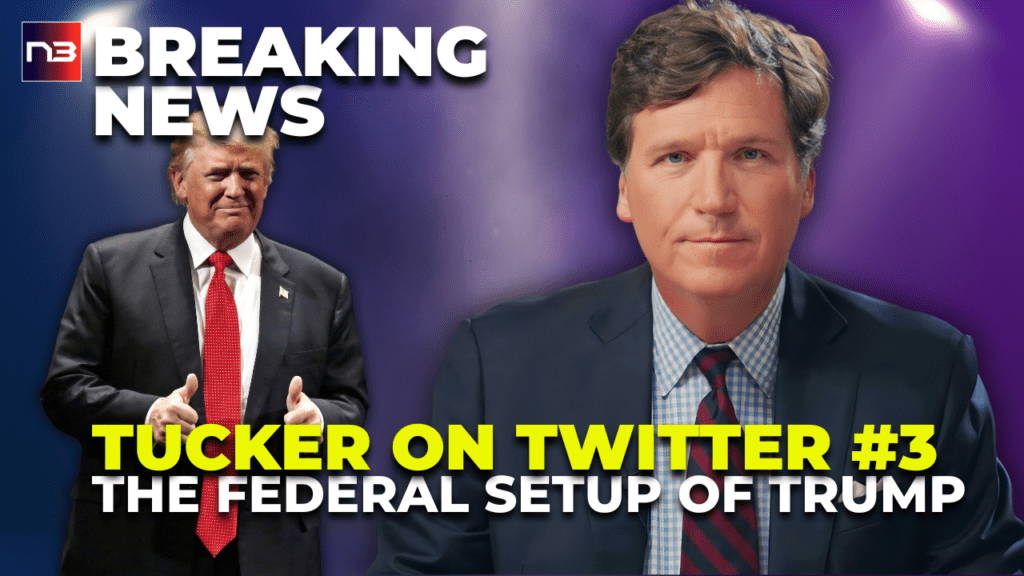In a recent explosive revelation, Tucker Carlson, the prominent political commentator, dived into the shadowy depths of American politics to unearth the alleged conspiracy against Donald Trump. A setup initiated on February 16, 2016, according to Carlson, from the moment Trump dared to challenge Washington’s foreign policy consensus. He argues that Trump’s arrest wasn’t a mere legal procedure but an orchestrated vendetta by those threatened by his radical, non-conformist ideals. Read on to unveil the clandestine machinations and the high-stake power plays at the heart of the American political landscape.
Tucker Carlson, known for his forthright critique of the political sphere, takes us back to February 16, 2016. This pivotal day, Carlson posits, marked Trump’s transformation into a formidable adversary of the Federal Government. Trump’s bold assertion during a Republican debate—voicing that the US should never have entered Iraq—threw a direct challenge at the political establishment. He rocked the boat by accusing Washington officials of deceit concerning the alleged existence of weapons of mass destruction in Iraq. This critique implicated prominent figures across the political divide, striking a nerve within the power corridors.
Ep. 3 America's principles are at stake pic.twitter.com/eJNSUVvvqY
— Tucker Carlson (@TuckerCarlson) June 13, 2023
Carlson asserts that Trump’s audacious defiance of the mainstream foreign policy narrative instigated the ire of the ‘permanent Washington,’ prompting a clandestine effort to derail his ambitions. Not only did he face resistance from the exterior, but also allegedly from within his administration. Carlson alleges that high-ranking officials such as Mike Pence, Nikki Haley, Mike Pompeo, and Lindsey Graham were wolves in sheep’s clothing. Their public praises of Trump were mere performances, hiding their private dissent and clandestine objectives.
In Carlson’s view, these officials’ seemingly sudden reversal of their loyalties, immediately after Trump’s loss of power, was a premeditated strategy. The underlying agenda, he contends, was to further the neocon war ambitions—an agenda that Trump had vehemently opposed.
Carlson also cast suspicion on the recent accusations leveled against Trump, specifically by Mike Pompeo, regarding alleged mishandling of classified documents. He sees this as a contrived pretext to malign Trump, asserting that Washington’s classification of documents has more to do with maintaining the existing political hierarchy than national security.
The political commentator perceives the legal pursuit of Trump as a weapon wielded by the Biden administration to neutralize its main political competitor. According to Carlson, it is an ideological attack that aims to silence Trump, a prominent critic of American foreign policy. Moreover, he believes it’s evidence of a judicial system influenced by political biases.
Carlson’s bold narrative has provoked widespread discussions and drawn attention to the political dynamics governing Washington. Regardless of one’s political inclinations, his analysis has undeniably shaped public discourse and opened new perspectives on Trump’s current predicament.
Interestingly, Tucker’s revelations come amid a souring relationship with his former employer, Fox News. Fox claims Carlson breached his contract by initiating his independent Twitter show, “Tucker on Twitter”, hinting at a possible lawsuit. This conflict is likely to intensify the ongoing public feud between the media personality and the network, adding another layer to an already complex political saga.
Tucker Carlson’s unflinching critique unveils a labyrinth of political conspiracies, hidden agendas, and covert power struggles. It paints a picture of an establishment threatened by non-conformity, leading to the alleged targeting of Donald Trump. Whether you stand by Trump or against him, one must concede that the episode is a dramatic testimony of the sinister underbelly of politics where truth may be stranger than fiction. It is an audacious endeavor that challenges us to reconsider our understanding of the world of American politics. Ultimately, Carlson’s analysis ignites a beacon that might illuminate the dark corners of the political establishment.


